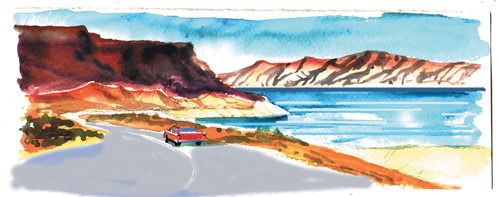Enjoy a scenic drive on Northshore Road

A splendid choice for a scenic drive near Las Vegas, the 62-mile Northshore Road, state Route 167, provides access to major developments such as Callville Bay and Echo Bay, as well as many other attractions within Lake Mead National Recreation Area.
It offers sweeping views of the lake, desert panoramas, rugged mountain backdrops, vivid sandstone cliffs and canyons, natural warm spring oases and an overview of a drowned ghost town. For a daylong outing, explore side roads or take one of several short hikes accessible from the paved route.
To reach Northshore Road from the Las Vegas Valley, follow either Lake Mead Boulevard over Sunrise Mountain or Lake Mead Drive from Henderson. By either approach, you will reach a Lake Mead National Recreational Area entrance station, where a $10 per vehicle entry fee applies, except for holders of various passes.
Those who frequently use the recreation area save with purchase of an annual pass. Senior citizens and disabled citizens avoid entrance fees and reduce other fees at all national parks and recreation areas with lifetime passes available for $10 for those 62 and older or free for disabled visitors. Inquire when you stop at the entrance station.
Cutting through desert regions with mounded hills of colorful mineralized earth, Northshore Road soon reaches expansive views of the lake with dark, flat-topped Fortification Hill buttressing the far shore. The wide "bathtub ring" exposed by falling water levels during recent years of drought is now shrinking as the lake rises following a good melt-off from last winter’s heavy snows in the Rocky Mountains and other western ranges.
Intriguing side roads wander down to the lake from Northshore Road. Explore unpaved routes only if you drive a high-clearance vehicle or one with four-wheel drive. Paved side roads along the route include access to recreational facilities and marinas at Callville Bay and Echo Bay, as well as a popular boat launching area at Overton Beach and picnic facilities at Rogers Spring.
Callville Bay and Echo Bay have campgrounds, convenience stores, cafes and motels. The boats moored at marina docks in the blue lake waters create colorful scenery and entertaining activity. Because of the low water level, the marinas were moved, sitting now at some distance from other facilities. They can be moved again if water levels continue to rise. The marinas remain centers for fleets of rental boats, from personal watercraft to large houseboats.
Watch for signs marking trail heads along Northshore Road. If you approach from Henderson, you pass a lovely short trail just after crossing Vegas Wash. From a large parking lot on the right of the road, this trail drops down along the running stream.
At Callville Bay, a trail begins near the campground’s dump station, climbing to a fine overview of the bay on its half-mile route.
Another popular trail lies about nine miles past the Callville Bay turnoff on the left side of Northshore Road. The half-mile Northshore Summit Trail reaches panoramic viewpoints over the expansive jumble of colorful sandstone formation called the Bowl of Fire. Save exploration of the Bowl of Fire for when you have a full day for hiking.
Brilliantly colored sandstone contrasts against the neutral desert in several locations along Northshore Road. The road passes closest to the sandstone at Redstone, a good spot to picnic and walk among the brightly colored monoliths.
A few miles north of the Echo Bay turnoff, look for Rogers Spring and a smaller spring nearby. Warm water springs feed shallow pools surrounded by palms and shade trees, popular for picnics. Follow trails along the meandering runoff stream or cross the footbridge and make the short climb to a viewpoint.
Northshore Road continues north to the turnoff to Overton Beach and then becomes the highway through Overton and Logandale to Interstate 15, passing the eastern entrance to Valley of Fire State Park. Opposite the park road, a trail heads for St. Thomas Cove, site of St. Thomas, a pioneer Mormon town submerged by Lake Mead in the 1930s but now exposed by the low water level.
Margo Bartlett Pesek’s column is published Sunday.